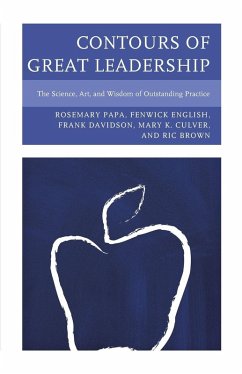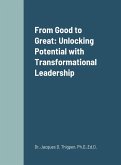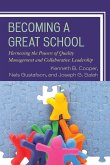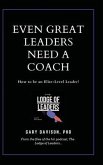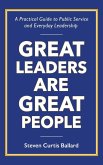Rosemary Papa, Fenwick W. English, Mary Culver
Contours of Great Leadership
The Science, Art, and Wisdom of Outstanding Practice
Rosemary Papa, Fenwick W. English, Mary Culver
Contours of Great Leadership
The Science, Art, and Wisdom of Outstanding Practice
- Broschiertes Buch
- Merkliste
- Auf die Merkliste
- Bewerten Bewerten
- Teilen
- Produkt teilen
- Produkterinnerung
- Produkterinnerung
This book brings together many aspects of concepts and theories of leadership. It is an amalgam of ideas from the social sciences and the humanities woven together in the idea of leadership as an accoutrement, that is, a deliberate woven garment comprising science, art, experience, and craft knowledge.
Andere Kunden interessierten sich auch für
![Great Lawyer to Great Leader Great Lawyer to Great Leader]() Midja FisherGreat Lawyer to Great Leader20,99 €
Midja FisherGreat Lawyer to Great Leader20,99 €![From Good to Great From Good to Great]() Jacques ThigpenFrom Good to Great38,99 €
Jacques ThigpenFrom Good to Great38,99 €![Great Muslim Leaders Great Muslim Leaders]() Great Muslim Leaders66,99 €
Great Muslim Leaders66,99 €![Becoming a Great School Becoming a Great School]() Kenneth B. CooperBecoming a Great School52,99 €
Kenneth B. CooperBecoming a Great School52,99 €![Even Great Leaders Need A Coach Even Great Leaders Need A Coach]() Gary DavisonEven Great Leaders Need A Coach35,99 €
Gary DavisonEven Great Leaders Need A Coach35,99 €![Great Muslim Leaders Great Muslim Leaders]() Great Muslim Leaders114,99 €
Great Muslim Leaders114,99 €![Great Leaders Are Great People Great Leaders Are Great People]() Steven BallardGreat Leaders Are Great People21,99 €
Steven BallardGreat Leaders Are Great People21,99 €-
-
-
This book brings together many aspects of concepts and theories of leadership. It is an amalgam of ideas from the social sciences and the humanities woven together in the idea of leadership as an accoutrement, that is, a deliberate woven garment comprising science, art, experience, and craft knowledge.
Produktdetails
- Produktdetails
- Verlag: R&L Education
- Seitenzahl: 144
- Erscheinungstermin: 27. Dezember 2012
- Englisch
- Abmessung: 260mm x 168mm x 8mm
- Gewicht: 276g
- ISBN-13: 9781610488310
- ISBN-10: 1610488318
- Artikelnr.: 36550996
- Herstellerkennzeichnung
- Libri GmbH
- Europaallee 1
- 36244 Bad Hersfeld
- gpsr@libri.de
- Verlag: R&L Education
- Seitenzahl: 144
- Erscheinungstermin: 27. Dezember 2012
- Englisch
- Abmessung: 260mm x 168mm x 8mm
- Gewicht: 276g
- ISBN-13: 9781610488310
- ISBN-10: 1610488318
- Artikelnr.: 36550996
- Herstellerkennzeichnung
- Libri GmbH
- Europaallee 1
- 36244 Bad Hersfeld
- gpsr@libri.de
By Rosemary Papa; Fenwick W. English; Mary Culver; Ric Brown and Frank Davidson
Table of Contents Preface Foreword Dedication Chapter 1 A Prism for
Understanding Great Leadership The Nature of Educational Leadership A Model
to Discuss Educational Leadership The Fluid Nature of Identity The Nature
of Accoutrements The Critical Questions in School Culture Bourdieu's
Concept of Reflexivity vs. Reflective Thinking More than 'Reflective
Evaluation Craft' An Example of Reflexivity: Rational Choice Theory as a
Silent Presupposition Chapter Learning Extensions Testing Your
Understanding of this Chapter about Great Leaders Chapter 2 Habits of
Reflection and Focus on Instruction Maturation of Leadership Shared
Leadership Focus on Instruction Hands-on Instructional Leadership Optimism
Working Together Habitual Values Reflection Chapter Learning Extensions
Testing Your Understanding of this Chapter about Values Chapter 3 The Most
Important Knowledge Begins with Self The Second Kind of Knowledge: The
Anchor of Professional Practice Professional Practice Based on Dogma Leads
to Tragic Mistakes The Fallacy of 'Research based' Knowledge as Superior
Ipsa Scientia Potestas Est: The Politics of Knowledge 1.Current Issue
Analysis: The Great Leaders Mentoring Knowledge 2.Current Issue Analysis:
Leading Curriculum Improvement 3.Current Issue Analysis: Student Retention
in Theory and in Practice 4.Current Issue Analysis: Technology and Its Role
in Teaching and Learning/Social Media 5.Current Issue Analysis: Trends of
the Day in Common Core State Standards 6.Current Issue Analysis: Families
and Communities Chapter Learning Extensions Testing Your Understanding of
this Chapter about Knowledge Chapter 4 The Acquisition and Refinement of
Skills and Insights to Inspire Others Great Leaders Prioritize Teaching and
Learning Great Leaders Build Strong Connections Great Leaders Maintain a
Disciplined Focus Great Leaders Learn to Manage Efficiently In Order to
Lead Effectively Great Leaders Choose to be Optimists Chapter Learning
Extensions Testing Your Understanding of this Chapter about Skills Chapter
5 Leadership Identity, Practice and Wisdom An Historic Example of an
Accouterment for all time: Jeanne d'Arc The American Jeanne d' Arc: Rosa
Parks From An Angry Young Man to a Person Of Ubuntu: An Example of
Self-Transformation The Multifaceted Nature of Human Identity Contextual
Changes: How the Model of Accoutrements Works Contextual Challenges to
Educational Leadership+ Learning How to Become Great Leaders Chapter
Learning Extensions Testing Your Understanding of this Chapter about
Identity Chapter 6 The Continuing Quest to Discern Leadership Contours
Original California Study The Future Demographics of America: Microcosm
Arizona Arizona Superintendents Principals-in-Training Arizona High
Achieving Schools Administrator Focus Groups The Quest of Identity through
the Contours of Leadership Chapter Learning Extensions Testing Your
Understanding of this Chapter about Contours List of Exhibits, Figures and
Tables Appendices Appendix A: The Learning Extensions Chart with Author
Commentary Appendix B: A Brief Description of the Contexts of Great
Leadership Appendix C: A Chronology of Peer-reviewed Research on the
Accoutrements
Understanding Great Leadership The Nature of Educational Leadership A Model
to Discuss Educational Leadership The Fluid Nature of Identity The Nature
of Accoutrements The Critical Questions in School Culture Bourdieu's
Concept of Reflexivity vs. Reflective Thinking More than 'Reflective
Evaluation Craft' An Example of Reflexivity: Rational Choice Theory as a
Silent Presupposition Chapter Learning Extensions Testing Your
Understanding of this Chapter about Great Leaders Chapter 2 Habits of
Reflection and Focus on Instruction Maturation of Leadership Shared
Leadership Focus on Instruction Hands-on Instructional Leadership Optimism
Working Together Habitual Values Reflection Chapter Learning Extensions
Testing Your Understanding of this Chapter about Values Chapter 3 The Most
Important Knowledge Begins with Self The Second Kind of Knowledge: The
Anchor of Professional Practice Professional Practice Based on Dogma Leads
to Tragic Mistakes The Fallacy of 'Research based' Knowledge as Superior
Ipsa Scientia Potestas Est: The Politics of Knowledge 1.Current Issue
Analysis: The Great Leaders Mentoring Knowledge 2.Current Issue Analysis:
Leading Curriculum Improvement 3.Current Issue Analysis: Student Retention
in Theory and in Practice 4.Current Issue Analysis: Technology and Its Role
in Teaching and Learning/Social Media 5.Current Issue Analysis: Trends of
the Day in Common Core State Standards 6.Current Issue Analysis: Families
and Communities Chapter Learning Extensions Testing Your Understanding of
this Chapter about Knowledge Chapter 4 The Acquisition and Refinement of
Skills and Insights to Inspire Others Great Leaders Prioritize Teaching and
Learning Great Leaders Build Strong Connections Great Leaders Maintain a
Disciplined Focus Great Leaders Learn to Manage Efficiently In Order to
Lead Effectively Great Leaders Choose to be Optimists Chapter Learning
Extensions Testing Your Understanding of this Chapter about Skills Chapter
5 Leadership Identity, Practice and Wisdom An Historic Example of an
Accouterment for all time: Jeanne d'Arc The American Jeanne d' Arc: Rosa
Parks From An Angry Young Man to a Person Of Ubuntu: An Example of
Self-Transformation The Multifaceted Nature of Human Identity Contextual
Changes: How the Model of Accoutrements Works Contextual Challenges to
Educational Leadership+ Learning How to Become Great Leaders Chapter
Learning Extensions Testing Your Understanding of this Chapter about
Identity Chapter 6 The Continuing Quest to Discern Leadership Contours
Original California Study The Future Demographics of America: Microcosm
Arizona Arizona Superintendents Principals-in-Training Arizona High
Achieving Schools Administrator Focus Groups The Quest of Identity through
the Contours of Leadership Chapter Learning Extensions Testing Your
Understanding of this Chapter about Contours List of Exhibits, Figures and
Tables Appendices Appendix A: The Learning Extensions Chart with Author
Commentary Appendix B: A Brief Description of the Contexts of Great
Leadership Appendix C: A Chronology of Peer-reviewed Research on the
Accoutrements
Table of Contents Preface Foreword Dedication Chapter 1 A Prism for
Understanding Great Leadership The Nature of Educational Leadership A Model
to Discuss Educational Leadership The Fluid Nature of Identity The Nature
of Accoutrements The Critical Questions in School Culture Bourdieu's
Concept of Reflexivity vs. Reflective Thinking More than 'Reflective
Evaluation Craft' An Example of Reflexivity: Rational Choice Theory as a
Silent Presupposition Chapter Learning Extensions Testing Your
Understanding of this Chapter about Great Leaders Chapter 2 Habits of
Reflection and Focus on Instruction Maturation of Leadership Shared
Leadership Focus on Instruction Hands-on Instructional Leadership Optimism
Working Together Habitual Values Reflection Chapter Learning Extensions
Testing Your Understanding of this Chapter about Values Chapter 3 The Most
Important Knowledge Begins with Self The Second Kind of Knowledge: The
Anchor of Professional Practice Professional Practice Based on Dogma Leads
to Tragic Mistakes The Fallacy of 'Research based' Knowledge as Superior
Ipsa Scientia Potestas Est: The Politics of Knowledge 1.Current Issue
Analysis: The Great Leaders Mentoring Knowledge 2.Current Issue Analysis:
Leading Curriculum Improvement 3.Current Issue Analysis: Student Retention
in Theory and in Practice 4.Current Issue Analysis: Technology and Its Role
in Teaching and Learning/Social Media 5.Current Issue Analysis: Trends of
the Day in Common Core State Standards 6.Current Issue Analysis: Families
and Communities Chapter Learning Extensions Testing Your Understanding of
this Chapter about Knowledge Chapter 4 The Acquisition and Refinement of
Skills and Insights to Inspire Others Great Leaders Prioritize Teaching and
Learning Great Leaders Build Strong Connections Great Leaders Maintain a
Disciplined Focus Great Leaders Learn to Manage Efficiently In Order to
Lead Effectively Great Leaders Choose to be Optimists Chapter Learning
Extensions Testing Your Understanding of this Chapter about Skills Chapter
5 Leadership Identity, Practice and Wisdom An Historic Example of an
Accouterment for all time: Jeanne d'Arc The American Jeanne d' Arc: Rosa
Parks From An Angry Young Man to a Person Of Ubuntu: An Example of
Self-Transformation The Multifaceted Nature of Human Identity Contextual
Changes: How the Model of Accoutrements Works Contextual Challenges to
Educational Leadership+ Learning How to Become Great Leaders Chapter
Learning Extensions Testing Your Understanding of this Chapter about
Identity Chapter 6 The Continuing Quest to Discern Leadership Contours
Original California Study The Future Demographics of America: Microcosm
Arizona Arizona Superintendents Principals-in-Training Arizona High
Achieving Schools Administrator Focus Groups The Quest of Identity through
the Contours of Leadership Chapter Learning Extensions Testing Your
Understanding of this Chapter about Contours List of Exhibits, Figures and
Tables Appendices Appendix A: The Learning Extensions Chart with Author
Commentary Appendix B: A Brief Description of the Contexts of Great
Leadership Appendix C: A Chronology of Peer-reviewed Research on the
Accoutrements
Understanding Great Leadership The Nature of Educational Leadership A Model
to Discuss Educational Leadership The Fluid Nature of Identity The Nature
of Accoutrements The Critical Questions in School Culture Bourdieu's
Concept of Reflexivity vs. Reflective Thinking More than 'Reflective
Evaluation Craft' An Example of Reflexivity: Rational Choice Theory as a
Silent Presupposition Chapter Learning Extensions Testing Your
Understanding of this Chapter about Great Leaders Chapter 2 Habits of
Reflection and Focus on Instruction Maturation of Leadership Shared
Leadership Focus on Instruction Hands-on Instructional Leadership Optimism
Working Together Habitual Values Reflection Chapter Learning Extensions
Testing Your Understanding of this Chapter about Values Chapter 3 The Most
Important Knowledge Begins with Self The Second Kind of Knowledge: The
Anchor of Professional Practice Professional Practice Based on Dogma Leads
to Tragic Mistakes The Fallacy of 'Research based' Knowledge as Superior
Ipsa Scientia Potestas Est: The Politics of Knowledge 1.Current Issue
Analysis: The Great Leaders Mentoring Knowledge 2.Current Issue Analysis:
Leading Curriculum Improvement 3.Current Issue Analysis: Student Retention
in Theory and in Practice 4.Current Issue Analysis: Technology and Its Role
in Teaching and Learning/Social Media 5.Current Issue Analysis: Trends of
the Day in Common Core State Standards 6.Current Issue Analysis: Families
and Communities Chapter Learning Extensions Testing Your Understanding of
this Chapter about Knowledge Chapter 4 The Acquisition and Refinement of
Skills and Insights to Inspire Others Great Leaders Prioritize Teaching and
Learning Great Leaders Build Strong Connections Great Leaders Maintain a
Disciplined Focus Great Leaders Learn to Manage Efficiently In Order to
Lead Effectively Great Leaders Choose to be Optimists Chapter Learning
Extensions Testing Your Understanding of this Chapter about Skills Chapter
5 Leadership Identity, Practice and Wisdom An Historic Example of an
Accouterment for all time: Jeanne d'Arc The American Jeanne d' Arc: Rosa
Parks From An Angry Young Man to a Person Of Ubuntu: An Example of
Self-Transformation The Multifaceted Nature of Human Identity Contextual
Changes: How the Model of Accoutrements Works Contextual Challenges to
Educational Leadership+ Learning How to Become Great Leaders Chapter
Learning Extensions Testing Your Understanding of this Chapter about
Identity Chapter 6 The Continuing Quest to Discern Leadership Contours
Original California Study The Future Demographics of America: Microcosm
Arizona Arizona Superintendents Principals-in-Training Arizona High
Achieving Schools Administrator Focus Groups The Quest of Identity through
the Contours of Leadership Chapter Learning Extensions Testing Your
Understanding of this Chapter about Contours List of Exhibits, Figures and
Tables Appendices Appendix A: The Learning Extensions Chart with Author
Commentary Appendix B: A Brief Description of the Contexts of Great
Leadership Appendix C: A Chronology of Peer-reviewed Research on the
Accoutrements

